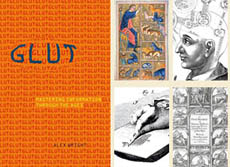Notes on Shlain
January 29, 2004
 A few raw notes from Leonard Shlain's talk at the SFPL last night:
A few raw notes from Leonard Shlain's talk at the SFPL last night:
In the Alphabet vs. the Goddess, Shlain posited a startling theory about the effects of alphabetic literacy on the human brain, suggesting that the advent of the alphabet directly precipitated the persecution of women throughout much of written human history. It was a controversial theory, and a difficult one to test through traditional disciplinary constructs.
True to form, Shlain's new book makes a similarly provocative claim. In a nutshell, he argues that our awareness of time � our species' crucial evolutionary differentiator � can be traced directly back to the female reproductive cycle. To explain his theory, he points out these uniquely human female traits:
- Concealed ovulation (all other animals give off clear external signs when they become fertile)
- Death during childbirth (no other animals risk their lives so frequently during labor)
- And most importantly, the mysterious synchronization of female menstruation with the cycle of the moon. Not only do other animals not share this rhythm, but only a handful of other animals (mostly primates) menstruate at all
And thus, he argues, women invented Time.
Temporal awareness - the ability to abstract experience into past and future - led inexorably to an understanding of death (a concept that, as far as we know, other animals do not share). The knowledge of birth and death, revealed through the prism of time, precipitated every subsequent social, religious and cultural evolution in human history.
So, that's the theory. Do I buy it? I don't know (I haven't read the book yet). Shlain's theory seems to place an enormous premium on biological imperatives, but seems to leave little room for sociality, or for what E.O. Wilson called "inclusive fitness": the notion that evolutionary impulses guide not just genetic reproduction, but macro social behaviors as well - sometimes even deploying individual organisms into non-"breeder" roles (e.g. worker bees, eunuchs, Carson Kressley) that benefit the super-organism as a whole.
Shlain also makes all kinds of generalizations about animals, of the "beasts abstract not" variety; for example, suggesting that only humans have evolved the ability to store and share knowledge. But that's a notably false assertion; there are numerous examples of animals acquiring and storing social knowledge through extra-biological mechanisms (a topic I explored here).
Shlain left enough conspicuous holes in his presentation to give me a certain level of pause. But whether or not you buy every assertion, there's no doubt Shlain is an original and provocative thinker. At times he seems to come out of deep left field - as in, out in the parking lot. He's unorthodox in the best possible way, an original thinker who ignores traditional disciplinary boundaries, who can seem at once half-crazy and brilliantly lucid. Whether he's ultimately an eloquent crackpot or a left-field genius (and he may well be both), he deserves a careful hearing.
File under: Books
_____________________« Shlain on Sex, Time & Power | Dogster bites back »
GLUT:
Mastering Information Through the Ages
New Paperback Edition
“A penetrating and highly entertaining meditation on the information age and its historical roots.”
—Los Angeles Times
